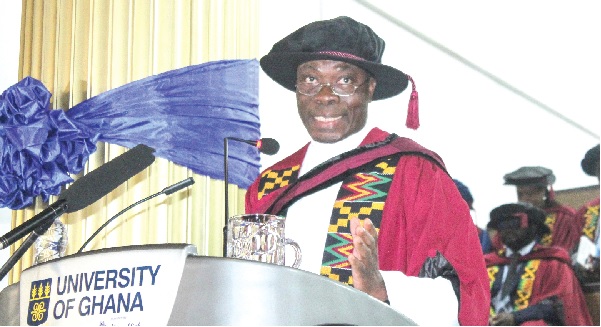
Mount pressure on govt to halt galamsey — Prof. Okyerefo
A former Head of the Department of Sociology of the University of Ghana has bemoaned Ghanaians’ failure to mount pressure on the government to halt illegal mining, commonly called galamsey, which has destroyed a number of water bodies and forest reserves in the country.
Rev. Prof. Michael Perry Kweku Okyerefo said Ghanaians could take a cue from the Kenyan youth who registered their frustration with a series of protests at the passage of a new tax Bill, and pressed for its withdrawal.
That protest forced the government to nullify the Bill, and led to the dissolution of the whole Cabinet and wider reforms in the eastern African country.
Delivering his inaugural lecture as a full professor at the Great Hall of the university in Accra last Thursday, Rev. Prof. Okyerefo said: "Think about this in relation to social movement of mass mobilisation of the youth like what happened in Kenya, forcing the President to rescind his decision to assent to a Bill passed by Parliament”.
"In the same vein, one could compare such mobilisation to the inability of Ghanaians to put pressure on the government to end galamsey. In all these, it is the individual or his biography that is at the centre of social action," the academician and Catholic priest said.
Rev. Prof. Okyerefo said the active role played by individuals was always influenced by social forces that could be both constraining and liberating.
He said it meant humans were active participants in the creation of social structures in their interactions with one another in the environment, while social structure intended to exert an overpowering influence on the lives of individuals.
Occasion
Rev. Prof. Okyerefo was the fifth and last in the institution to deliver an inaugural lecture for the academic year.
His lecture was on the topic: "The autobiography self as an object for sociological enquiry".
It examined the concept of the interaction between the individual's life course and the social world, further drawing on his personal experiences of teaching and researching in different societies.
He focused on autobiography or biography and social structure intertwined; the biographical method could make sociology a discipline tenable in all societies and cultures, and how to inspire the young ones to read sociology.
Inspiration
Rev. Prof. Okyerefo inspired young people wanting to pursue Sociology as a career that the discipline aroused one's curiosity to understand one’s self in relation to society.
In establishing the relevance of the course to students, Rev. Prof. Okyerefo said it helped individuals to develop appreciation for the constant symbiotic interactions between social structures and actors in an ongoing dynamic situation that could be observed and explained within historical and contemporary events.
Dwelling on the African emancipatory imagination, which the discipline could bestow on students, the academician said sociology was neither the preserve of any society or culture nor could it be dictated by any specific methodology or theoretical process.
In doing justice to the topic, the Catholic priest underscored the fact that where a person was born, lived or grew up had a fundamental impact on the quality of life, life choices, opportunities and even life expectancy.
He established that it was the physical interaction with society and nature that led to the formation of habits, skills and disposition in a way that shaped the individual's experiences and their ultimate social realities.
Rev. Prof. Okyerefo said when social actors engaged in social actions through their agency, their actions informed their society which in turn influenced their biography, and, therefore, organised individuals’ actions became collective action that mounted social pressure for change.
The lecture, which was attended by people from all walks of life but dominated by bishops and priests from the Roman Catholic faith, was to, among others, awaken young people's imagination to enable them to see their social self as linked to their social structure.
According to him, the relationship between people and their environment thrived on a wide spectrum of factors, including language, interacting with people from diverse social backgrounds, and an appropriation of different cultures and world views for peaceful coexistence.
In this context, he singled out Ghana's first President, Dr Kwame Nkrumah, for praise for introducing the boarding house system to promote social cohesion.
Rev. Prof. Okyerefo said that was why it was necessary to promote a value of respect for all different groups of people, which shaped their autobiography, knowing that such autobiography was shaped by the social structure but not captive to it.
African identity
In responding to the African identity crisis, the scholar challenged the idea of Europe taking credit for anything good that happened in the world.
The professor, also a former Dean of the School of Arts, said there was so much misrepresentation in the attempt to credit the West with things that predated them.
For instance, he said, the first university in the world which still continued to award degree, was the University of Al-Kairouine in Fez, Morocco, established by a woman called Fatima Al-Kairouine Fihri, and not Cambridge as had been claimed by some scholars.
"Knowledge knows no boundary. Therefore, it is important to dismantle the cultural, political and social barriers that guarantee the Western world as having monopoly to knowledge," he said.
He expressed his displeasure about how people were judged based on the colour of their skin or where they came from, citing how people from the West, who, for instance, worked with the United Nations could be referred to as expatriates and those from Africa as migrants.
